Why Enterprise Mobile App Development Is Set to Scale Heights in 2024
28 May 21 


We are living in a competitive world. Every company is in a race with its peers to achieve the best operational efficiency. They make use of the latest innovations to streamline their workflows and achieve their goals. And in this digital-driven era, it isn’t surprising that organizations would opt for mobile apps to improve their efficiency, right? Therein lies the seed of enterprise mobile app development.
Large organizations have a handful of processes to handle every day. Managing and optimizing these processes in the best way possible by saving time, money, and resources is a challenge they face. What if the companies had a mobile app to organize their internal and external processes? Wouldn’t that be a great solution!
Statistics agree.
The revenue of the enterprise mobile app market is anticipated to reach $430 billion in 2021.
65% of companies use 2-5 enterprise apps for various needs.
That shows its popularity and demand in the present and future- mobile apps are important for business. Do you want to know more about enterprise apps? Then, you are at the right place. In this article, we will be touching on all topics related to enterprise app development. So, let’s start right away.
What is Enterprise Mobile App Development
The process of developing mobile apps for carrying out an enterprise’s operations is called enterprise mobile app development. Having an app to connect to their enterprise is every employee’s wish. It brings so much ease to their work and keeps them connected, whether they are in the office or outside. And not just employees, business owners, stakeholders, and even clients can benefit from enterprise apps.
Every enterprise app is built to adhere to the particular organization’s strategy. Automation of workflows and improving the productivity of employees are among the topmost reasons for choosing enterprise apps. And making the applications available on smartphones is, ofcourse, a predicted move considering the integration of mobile apps in people’s daily lives. In short, mobile enterprise apps can improve an organization’s competency, sales, and communication.
How Enterprise Mobile App Development is Different
Since the users of an enterprise mobile app are the employees of an organization, their development focuses on different aspects compared to consumer-oriented mobile app development.
A significant difference is observed when concerning security features. As the enterprise apps may have access to the organization’s databases and will be dealing with confidential data, a high-security design is a must-have. The apps must also be flexible and consistent. Since even the slightest error can cause big losses to the company, these aspects have to be strictly maintained without any compromise.
There are also differences when it comes to app distribution and legal formalities. The guidelines of the app market might be different for enterprise apps, so differences in compliance regulations are to be expected. Further, an enterprise app has to be integrated to an organization’s existing setup. This also brings some new challenges in creating enterprise apps.
What are the Different Types of Enterprise Mobile Apps
Enterprises may have different needs for their mobile application. It depends on the people who use the app, the purpose of the app, and the type of enterprise. To satisfy different needs, there are different types of enterprise apps. We can classify them into mainly three types.

1. Employee Level
This is the simplest type of enterprise mobile app. They are used by the employees of an organization exclusively for their internal purposes. Employee level apps usually have only a small number of features to facilitate employees’ working. Like an in-app messaging feature to improve the communication between project members and managers. They ensure easy collaboration, fast communication, and quick updates.
2. Department Level
Department level apps are aimed to meet the needs of specific departments. These can help to improve the productivity of particular departments and ease their workflows. For example, an HR management app can simplify various tasks related to employees such as onboarding, attendance management, leave applications, etc.
3. Company Level
This is the most advanced form of enterprise mobile apps. These apps connect the entire organization and bring it to a single platform. Here employees of all levels can connect with each other, be it a CEO or a developer. These apps can also serve as a central platform for users to access enterprise databases and documents.
What are the Top Eight Reasons to Develop an Enterprise Mobile App
The working environment of organizations has gone through several changes. Today, an employee needing any information from the workplace doesn’t go checking notice boards or asking other employees. Instead, they make use of enterprise mobility solutions. The transformation is truly commendable.
If your organization hasn’t ventured into enterprise mobile app development yet and you are interested to know the benefits that it offers, we hope to clear all your concerns by the end of this section. So, why choose enterprise mobile apps?
1. Better Data Management
Data management is a key challenge for all organizations. Operations like data processing, analysis, and authentication take much effort. A mobile app can help to greatly simplify these processes. Further, it can make data management more transparent through real-time data sharing. By utilizing cloud technology, information can be shared anytime from anywhere, thus improving the overall efficiency of companies’ operations.
2. More Productivity
Enterprise mobile apps can help to reduce paperwork and bring automation to tasks. This helps employees save time and lets them focus on tasks that require their expertise. Thus, there is a shift in employee productivity. Moreover, handy features in the apps like notifications, calendars, etc., help them stay on top of their schedule and improves their efficiency.
3. Efficient Communication
Enterprises often rely on emails to communicate. Although it is a good tool for communication, employees who are not serving desk jobs miss out on emails. If a mobile app is designed for the enterprise, it can include chat features that would make information sharing easier, faster, and convenient for all.
4. Increased Security
Key consideration while developing enterprise mobile apps is security. It uses several technologies to add security to the mobile app. So organizations can store and share data related to their operations through the app without worrying about cyber-attacks or data leakage.
5. Improved Employee Data Management
Every data related to employees, right from the onboarding stage, can be efficiently stored using enterprise apps. By keeping an online record of employees that includes their personal details, qualification, certifications, etc., it becomes easy to access, manage, and update employee data whenever required.
6. Inclusive Work Culture
The success of organizations hugely depends on the satisfaction of employees. For employees to feel satisfied, they must feel connected to the organization. And what better way to build an effective and inclusive work culture than a mobile app? Whether it is sharing information, giving feedback, or conducting workshops, enterprise mobile apps can serve as a central platform to bring the entire organization together.
7. Better Operation
Enterprise mobile apps can help to uplift operational efficiency to a large extent. For example, for businesses using e-commerce applications, a mobile app that helps to improve money management can be a great addition. Similarly, for logistics-related enterprises, an app that facilitates better management of supply chain operations is a great boon.
8. Greater ROI
By giving employees a means to carry on with their work more effectively and productively, organizations are empowered to achieve greater return on investment. Considering the influence of ROI on the very existence of a company, it is indeed a benefit that offers excellent value.
How Can Enterprises Ensure Mobile App Security
Data security is crucial for any app, but more so for enterprise mobile apps. Along with dealing with confidential information, the fact that employees would be using various devices to access the app makes security maintenance an important concern for enterprise mobile application development.
Let’s take a look at the different ways in which the security of enterprise apps can be ensured.
- Make sure that while choosing the mobile app development framework, you use the latest software or platforms. Outdated versions increase the chance of cyberattacks.
- Strictly follow encryption methods and standards so as to make it impossible for hackers to break into the enterprise system.
- While implementing authentication, go for two-factor authentication or multi-factor authentication. It is very important for the security of enterprise apps
- Maintain a security checklist during the planning stage itself and try to predict all threats that may occur during or after development. Find ways to combat these threats.
- Ensure proper API security to secure all aspects of the application that rely on APIs.
- Use centralized management tools to restrict access to applications and data in cases of theft or missing devices.
What are Some of the Enterprise Mobile App Development Challenges
Considering the differences in enterprise mobile app development compared to consumer-facing app development, it poses some challenges that have to be addressed. Here we will discuss what they are.
1. Integration with existing services
Most times, enterprises will have existing back-end services with which the new enterprise apps will be integrated. Unfortunately, these back-end systems often tend to be outdated legacy systems. This can be very challenging for the app development team and can slow down development.
2. API Strategy
APIs are integral for the development of enterprise apps as they carry out the functionalities of the apps. A proper API strategy is necessary for seamless functionality and achieving the right balance between UX and security. Sometimes it may be possible to meet app requirements with existing APIs. Other times, they might need modifications or even new API creation. Developers must evaluate this in detail.
3. App Security
Mobile app security concerns are one of the biggest challenges enterprise solutions face. According to a Hubspot report, 40% of business-related apps are vulnerable to threats. From user data security to enterprise data protection and minimizing OS vulnerabilities, enterprise apps must consider security as key and use strict measures to maintain it.
4. High Expertise
Enterprise mobile app development requires a more advanced approach and hence calls for highly expert talent. Developing an app that satisfies the client’s needs while addressing key concerns like security, database integration, good UI UX, etc., needs a more expert hand. Further, mobile app developers may need much more understanding of the app’s working than normal consumer-facing apps.
5. App Distribution
Several compliance-related aspects come into play while building enterprise apps. This brings to play extra regulations as well as legal aspects while moving towards app distribution. This is more challenging than normal app distribution and requires more effort.
Things to Consider When Choosing Enterprise Mobile App Development Platform
A mobile enterprise development platform or MEAP is a set of tools used for the development, testing, deployment, and management of enterprise apps. Choosing a suitable MEAP is among the first things to sort while going for enterprise mobile application development. A great advantage of MEAP is that it is cross-platform. Therefore, developers don’t have to create separate apps for different OS, significantly reducing the time and effort required.
Since MEAPs are at the foundation of enterprise app development, it will be helpful to know about the things to consider while making this choice, right? We are here to help you with that. Read on.
1. Supports Easy Integration
The enterprise mobile app that you build must blend in with your organization’s existing systems quite well. Its introduction should not cause any major disruption. This is an important point to consider while choosing a platform, as most enterprises will be using some software for their day-to-day work. The platform should promote simple app integration with current business applications.
2. Ensures Security
We already discussed the importance of security for enterprise apps in the previous section. Corporate data, being information that contains much value, is a luring feature for hackers. So, platforms that use the latest security standards, implement encryption, and uphold security in all aspects must be prioritized.
3. Comprehensive App Management
Even before starting the app development, a good idea should be created about the ways to manage the app. For example, you might need to manage people’s access, take reports, track performance, etc. The platform you choose for development must help you implement all the desired management activities. The mobile app development services you choose must help you with this process.
4. Encourages Innate Development
Although enterprise app development will require the technical expertise of developers, MEAP helps organizations drive the development. Therefore it is essential to have a complete understanding of the organizations’ goals so as to encourage intuitive development. The platform that you choose must be easy to use and help you carry out development smoothly.
5. Provides Real-Time Updates
Getting real-time updates of the app development can help to save a lot of time and effort in the long run. If developers make any mistakes, it can be discovered early on and fixed. So, MEAP should have a feature to provide real-time status updates about the development.
Which are the Five Best Enterprise Mobile App Development Platforms
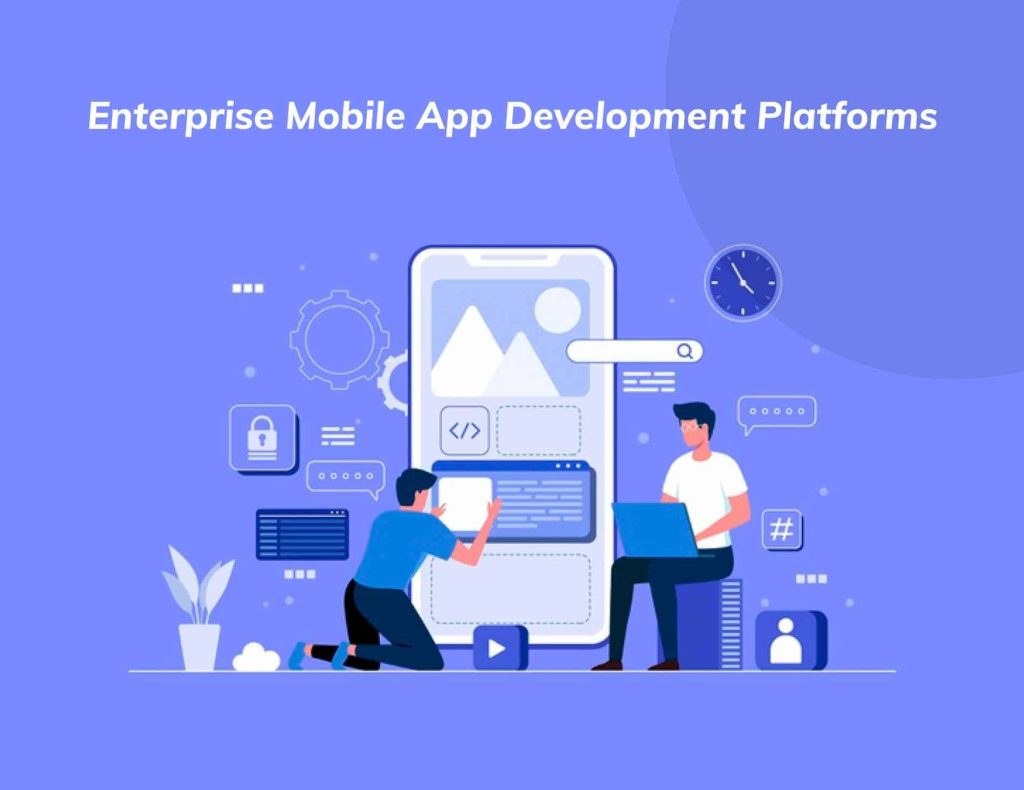
As enterprise apps are catching more attention, several platforms that offer easy development of solutions are coming into the market. Each platform has its own unique characteristics. Here, we will list the five best platforms that are outshining the rest with their bespoke features.
1. Outsystems
Outsystems is renowned for its rapid app creation and deployment. Along with accelerated app development, it offers unparalleled efficiency and great flexibility. It is a very feature-rich platform that makes implementing business logic a breeze. One of the greatest strengths of Outsystems is that it is a cloud-based platform. Thus, it can meet varying business needs in the best possible way.
Further, it offers easy integration capabilities, providing a seamless way to merge with existing systems or legacy databases. A characteristic worth mentioning of Outsystems is its visual development interface. It simplifies enterprise app development by providing drag and drop functionality for UI, data models, business processes, etc.
2. Zudy
A leading name in the low code enterprise app development platform, Zudy helps create robust applications using its software called Vinyl. Vinyl is powerful, intuitive, and can be used by businesses of all scales for fast enterprise app development. It offers a powerful end-to-end no code platform that allows enterprises to explore innovative functionalities and create advanced applications. It also helps to leverage existing systems to create modern and responsive designs. It is an intuitive platform trusted by several companies for their app development.
3. Plant an App
Plant an App is a platform developed with an aim to bridge the gap between technical and non-technical people involved in the enterprise app development process. It endorses low code technology without diminishing the role of developers. Speed of low code but no compromise on power and flexibility of custom coding is their mantra. With its inclusivity of technical expertise, it is creating a unique mark in the market.
It has hundreds of pre-built modules that make app development simple and easy. Further, its powerful API builder helps you integrate with any solutions. It is also a budget-friendly platform that offers excellent values.
4. Mendix
Noted for its extensive low-code or no-code application development, Mendix is a prominent platform for enterprise app development. It has several attractive features that draw businesses towards choosing it. One such feature is that it empowers business owners to build apps by themselves without any developer help. It follows a tailored development process to achieve this and is a great benefit for small businesses.
Mendix is unique in offering cloud portability features, allowing companies to move their application to other cloud-based environments if ever needed. It also supports private cloud installations. Moreover, it has found Mendix Marketplace, where developers can share their modules like data connectors, interface elements, etc., with platform users.
5. Kintone
A platform that is built for enhancing teamwork, Kintone lets organizations bring the working of various departments into a single space. Creating a dynamic centralized database that requires no coding is an exceptional characteristic of Kintone. It’s been recognized as a top low code app development platform by industry experts like Gartner and Forrester. In addition, it is appreciated for its various interactive features like multilingual interface, chat integration, etc.
What are the Steps in an Enterprise Mobile App Development Process
Right planning will make enterprise mobile app development simple and effortless. Having a set app development process to follow will greatly help to achieve this. It will ensure that your needs are met, the journey isn’t time consuming, and a quality app is developed. Let’s take a look at various stages involved in a typical enterprise app development process.
1. Identify Business Objectives
The first step is to identify the business objectives of the app. Here, you should be clear about two things- why are you building this app, and who are you building it for. Depending on it, the type of app has to be determined- whether employee level, department level, or company level. Once the app’s purpose is defined, its goals and objectives are set. Thus, the required functions and features are also identified.
2. Choose the Development Platform
There are various mobile app development platforms that promote developing enterprise apps. We already discussed five of them in the earlier section. Several factors determine the choice of the development platform- like the level of your app, features you want to implement, your budget, etc. After looking at all the platforms available in the market, you can choose a platform that is best suited for your needs.
3. App Design and Development
In this stage, you move towards the physical development of the mobile app. First, Wireframing and prototyping are done to get an idea about how the actual app will look and work. If there are any changes, it can be done then itself before moving towards final app development. Once the prototype is fixed, you move to UI UX design to ensure that the app is user-friendly and usable. Then comes development, where suitable tech stacks are chosen, and coding is done.
4. Testing and Maintenance
Although testing will happen as a natural part of the workflow in the previous stage, once the development is finished, your enterprise app will undergo intensive testing. This can be both quality assurance testing as well as user testing. QA testing mostly looks at finding bugs and employee testing ensures the app delivers what the users need. Maintenance comes after app release and will be a recurring process throughout the app lifecycle. It takes care of any later bugs, incorporates feedback from users, and gives timely updates.
Five Enterprise Mobile Application Development Trends for 2023
Mobile app development has broken all records in 2021. From 2019 to 2023, the worldwide revenue of mobile apps is predicted to almost double. A similar trend is expected in enterprise app development as well, considering the normalization of remote work and more widespread implementation of digital transformation. Therefore, keeping up with mobile app development trends becomes paramount in such circumstances as that is what will help you distinguish your app from the rest.
Let me walk you through the five top enterprise mobile app development trends for 2023 in this section.
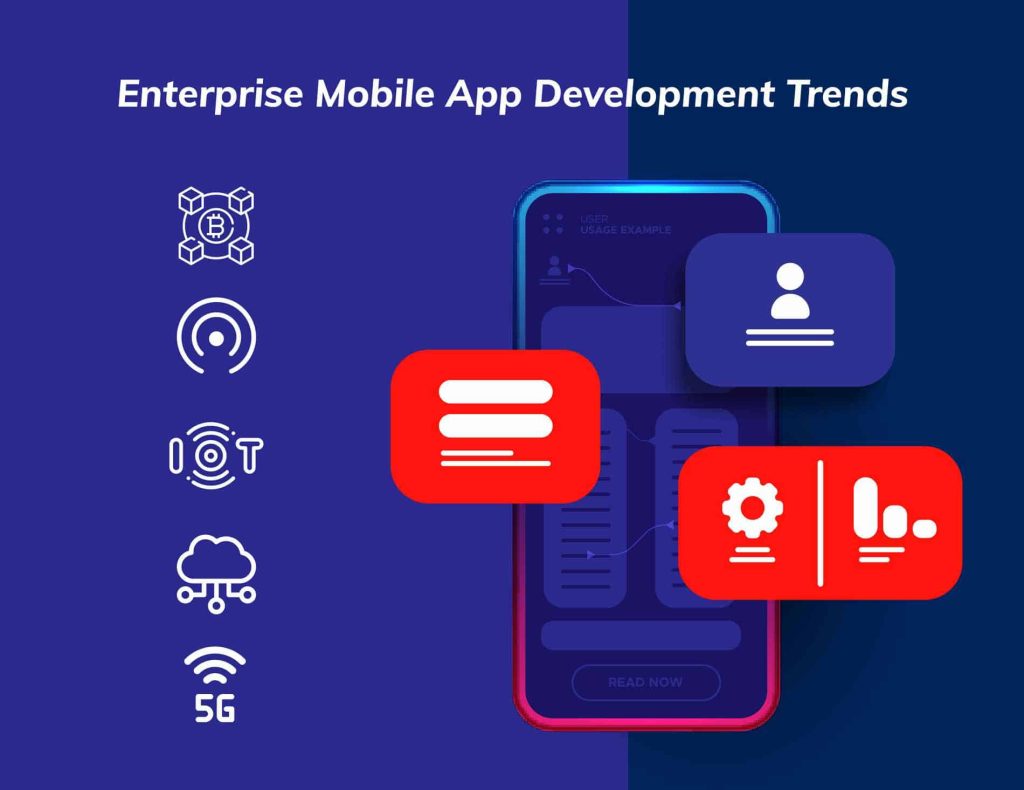
1. Blockchain
Security being a key aspect in enterprise mobile apps, Blockchain is a trend that has a lot of potentials. It offers a higher level of data protection by creating distributed databases that are connected by cryptographic methods. This decentralized data storage approach makes fraud detection easier and data hacking nearly impossible. In 2020, the implementation of Blockchain technology increased by almost 80% and is forecasted to take off in 2023 further.
2. Beacon Technology
A technology that makes communication and location-based interaction easier, beacon technology has much to offer for enterprise mobile apps. This uses bluetooth technology to transmit information to nearby smart devices making communication within an enterprise more efficient. We have witnessed beacon technology find popularity in the retail industry. For enterprises as well, a similar trend is expected to rise.
3. The Internet of Things (IoT)
Wherever there is a need for connectivity, IoT finds application. In an organization where there are many devices, interconnectivity among the devices can bring considerable value to the companies’ operations. So, it will not be surprising to see enterprise and IoT app development grow hand in hand in 2021. It will make enterprise apps more efficient, incorporating, and convenient.
4. Cloud
Considering the various benefits that Cloud technology offers, it is being leveraged more and more by mobile app developers. However, since enterprise apps may have considerable storage requirements, they may not be equally agreeable for all employees. Cloud provides a simple and robust solution to this concern. Furthermore, it is cost-effective as well as reliable.
5. 5G
Enterprise apps will require frequent data transferring among users. The speed and flexibility offered by 5G technology can be of extreme benefit for this requirement. The capabilities of 5G will elevate the apps to a new level, making them smooth and powerful. As the world is going more digital, a speedy connection is at the heart of effortless operations. So, enterprise mobile application development will embrace 5G with both hands.
What is the Cost of Enterprise Mobile App Development
Enterprise mobile apps can be of different functionalities, and depending on them, the development cost can vary. Although it is difficult to put an exact price on app development, we can surely give an estimate. Simple enterprise apps with basic features can be built on a budget of $20,000 to $30,000. But if your requirement is for a high-end application that needs to include multiple functionalities, then the cost can go upto $350,000. By choosing the functions and features carefully, it is possible to get an enterprise mobile app developed in the mid-range.
The cost to develop a mobile app is further dependent on factors like the developer’s location, development team size, platform, and development approach. Outsource app development is generally more cost-effective, although there are certain risks associated with it. However, with good research, the right planning, and a reliable company to help you, it is definitely a great approach.
How to Choose the Best Company for Your Enterprise Mobile App Development
We know it’s a very tough choice to make. The right company will help you create a mobile app that will elevate your organizations’ operations. But, at the same time, the wrong choice might result in a loss of investment and an app that’s barely used. So how can you make the right decision? Before we tell you what to look for, we will tell you what to avoid.
Imagine you approach a company to develop your enterprise mobile application. And before you even share your enterprise goals with them, they say yes to app development. That’s your cue to politely say thank you and leave! Since enterprise app development is a very custom approach, a development company must first listen to your mobile app idea and strategy and say yes only after discussing the various possibilities with you. Otherwise, you will end up with an app that is not at all what you needed!
Now, how do you pick a reliable company? Make sure they check the following points.
- They listen to your requirements and understand what you need
- They discuss their app development process and approach with you
- They provide insights into how they can bring innovation to your idea
- They share with you their previous projects and experiences
- They transparently discuss the pricing structure
If a company passes this checklist, that’s a green flag!
At Mindster, we make sure that we listen to our client’s every need and requirement. We do what they want us to do, and we take the utmost pride in satisfying our clients. Our app development strategy is top-class and transparent. We thoroughly enjoy the process of discussing your app requirements and offering our expertise to develop the best solution for your needs. Do we sound like the mobile app development company you want? Well, we think so too! So get in touch with us, and let’s discuss your app idea further!
- Agentic AI1
- Android Development3
- Artificial Intelligence38
- Autopay1
- Classified App3
- Custom App Development5
- Digital Transformation12
- Doctor Appointment Booking App14
- Dropshipping1
- Ecommerce Apps40
- Education Apps2
- Fintech-Apps38
- Fitness App4
- Flutter4
- Flutter Apps20
- Food Delivery App5
- Grocery App Development1
- Grocery Apps3
- Health Care10
- IoT2
- Loyalty Programs11
- Matrimony Apps1
- Microsoft1
- Mobile App Maintenance2
- Mobile Apps134
- On Demand Marketplace1
- Product Engineering6
- Progressive Web Apps1
- React Native Apps2
- Saas Application2
- Shopify9
- Software Development3
- Taxi Booking Apps7
- Truck Booking App5
- UI UX Design8
- Uncategorized7
- Web App Development1








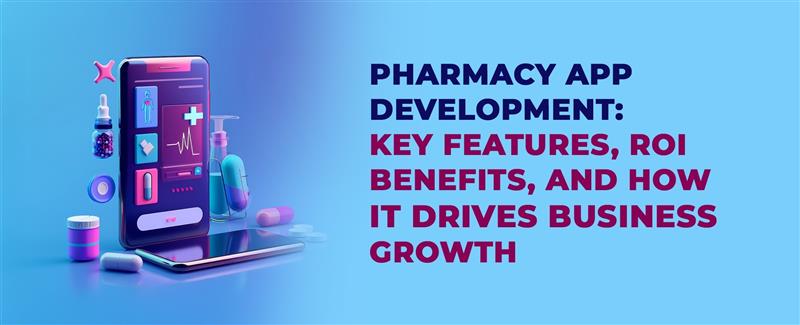
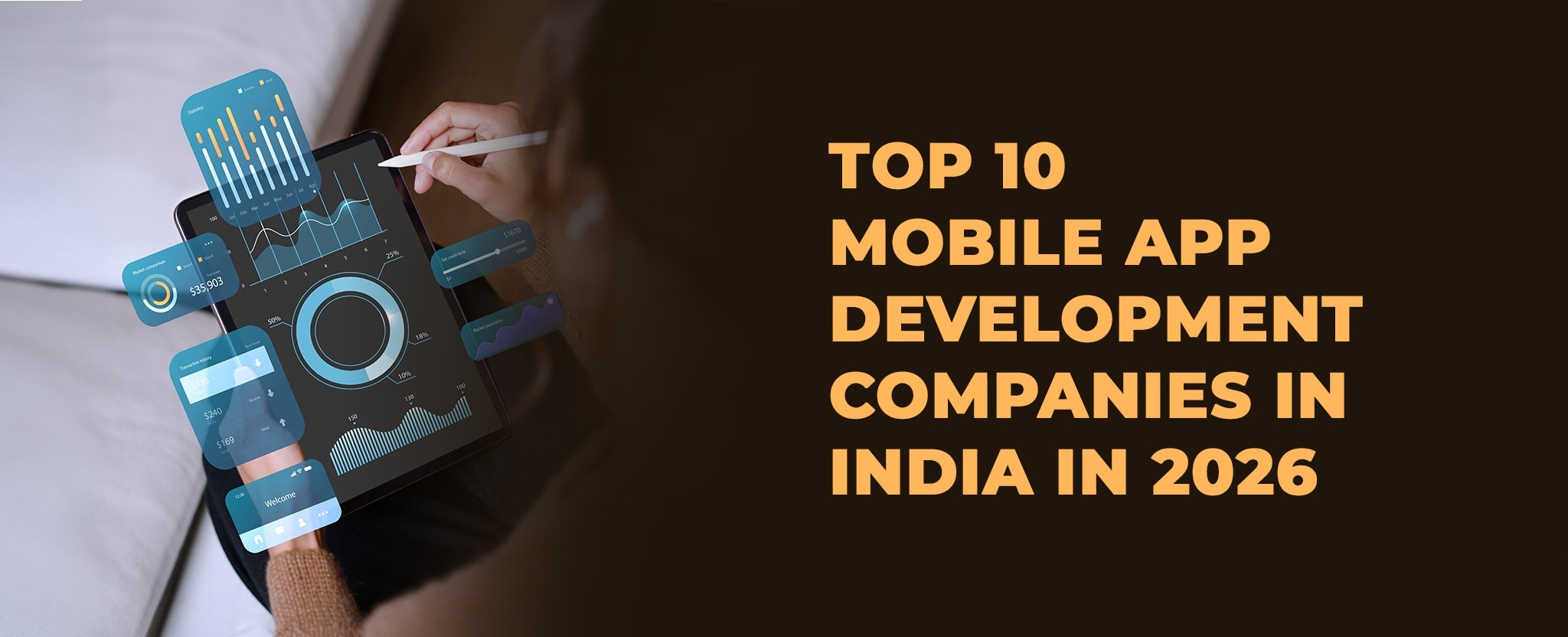

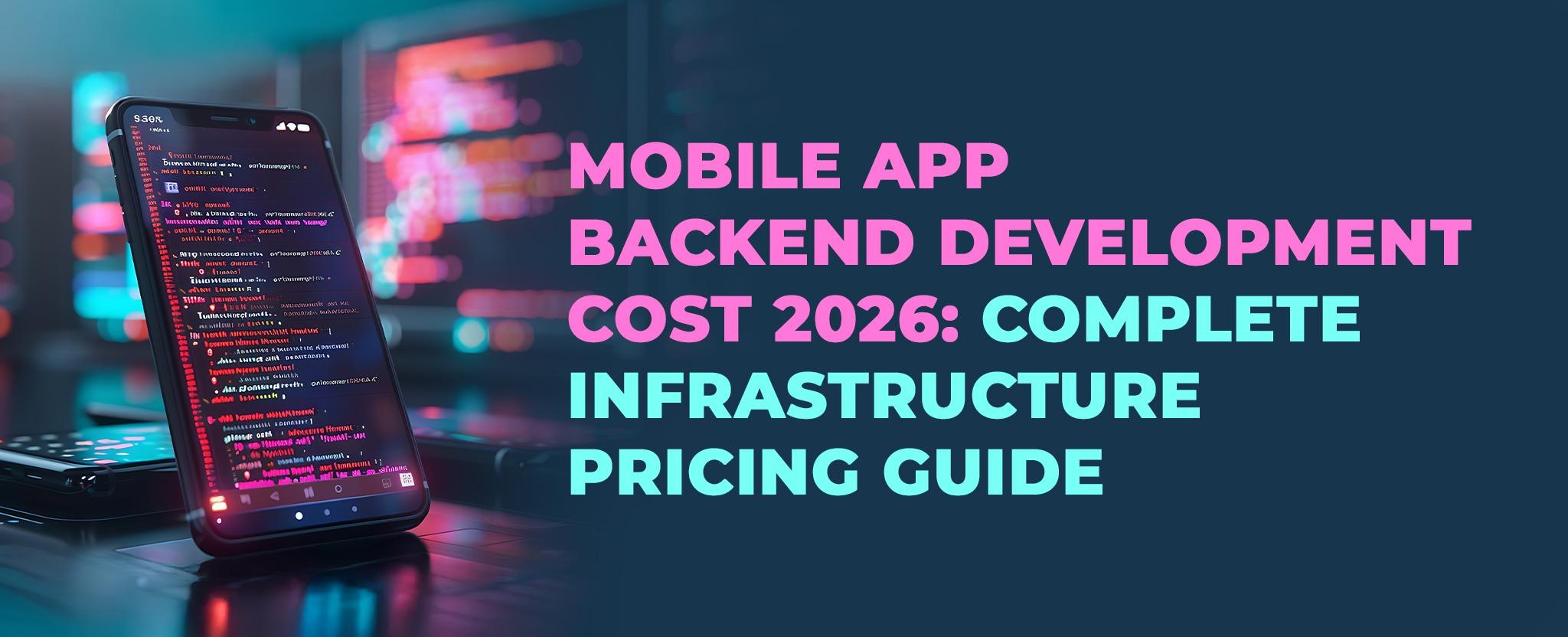






[…] various other factors. For example, filing a patent can be crucial for a business that focuses on enterprise mobile app development but may not be as meaningful for other applications. With all the detailed information given above, […]